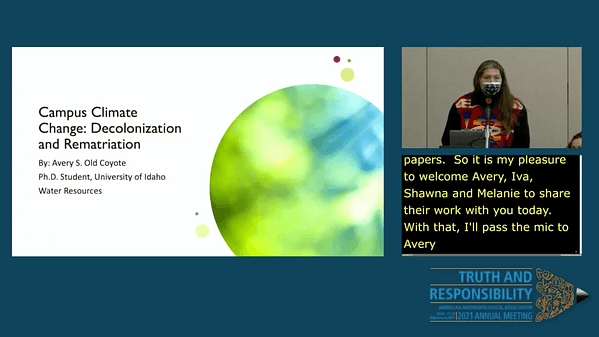Would you like to see your presentation here, made available to a global audience of researchers?
Add your own presentation or have us affordably record your next conference.
keywords:
indigenous knowledge
decolonization
education
The 2021 conference theme of Truth and Responsibility is not novel for Indigenous and allied scholars whose decolonial work has long called out ways anthropological research serves settler colonial continuance of Indigenous erasure, ongoing inequities, and structural violence (Simpson, 2017; Patel, 2016). Indigenous and decolonial studies have a history of proposing paradigmatic and conceptual shifts about how, with whom, and for what purpose research and knowledge production are engaged (Denzin et al., 2008; Brayboy et al., 2012; Ranco, 2006; Smith, 2012); these calls are even more timely as the COVID19 pandemic amplifies a landscape of deeply rooted and grave inequities in the treatment of Indigenous and other minoritized peoples across institutional structures and through narratives build on colonial unknowing. While the act of questioning institutionalized settler colonialism in research on human behavior, language, and cultural worlds is not new for Indigenous and decolonial social science research, institutional acceptance of Indigenous and decolonial research methods as legitimate forms of rigorous intellectual inquiry for the public good have not experienced wide reception (Sumida Huaman & Mataira, 2019). This session is predicated on a belief that institutions commit to engaging Indigenous and decolonial methodologies, with respect and material accountability, in ways that dismantle the “guest paradigm” that maintains Indigenous peoples struggle for social and restorative justice in the margins (Morgan, 2019). We forefront Indigenous peoples’ rights to participate and transform the anthropological present and future agenda which is “defined and constructed by” the dominant membership. Session papers advocate for an agenda beyond the perception of equity as “sameness,” and move toward an agenda premised in the notion of “uncompromised veracity of unceded sovereignty” (Morgan, 2019, 126). This oral presentation session put forth by standing committee #7 in the Council for Anthropology and Education illuminates the gifts of Indigenous and decolonial scholarship as paradigms to that support human diversity of knowing in higher education. Papers highlight a continued tradition among Indigenous and decolonial scholars to speak truth to settler colonial hegemony, to engage in scholarship that contributes to epistemological diversity in equitable ways, and to celebrate the transformative potential of community-academic partnerships that engage the vibrancy of Indigenous and decolonizing thought (Parker et al., 2017). The collective research featured in this session showcases new and emerging scholar-educators who are. mapping new possibilities for social inquiry in education while making the road as they walk it. Questions we ask/address: How do Indigenous and de-colonial scholar-educators: • Hold anthropology accountable through truth telling from multiple locations? • Grapple with doing the double work of mapping their own historically- and geographically-located epistemologies and ontologies while also being made to explain scholarship in ways intelligible to the academy? • Reimagine anthropology toward greater respect, responsibility, reciprocity, and accountability to Indigenous place, ontologies, and epistemologies? • Push against the tensions of technocratic and universalizing agendas through work that centers historically- and geographically-located epistemologies and ontologies?

